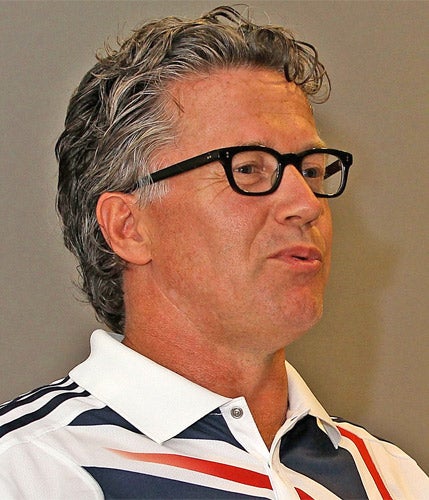Athletics track must stay, says GB coach

Your support helps us to tell the story
From reproductive rights to climate change to Big Tech, The Independent is on the ground when the story is developing. Whether it's investigating the financials of Elon Musk's pro-Trump PAC or producing our latest documentary, 'The A Word', which shines a light on the American women fighting for reproductive rights, we know how important it is to parse out the facts from the messaging.
At such a critical moment in US history, we need reporters on the ground. Your donation allows us to keep sending journalists to speak to both sides of the story.
The Independent is trusted by Americans across the entire political spectrum. And unlike many other quality news outlets, we choose not to lock Americans out of our reporting and analysis with paywalls. We believe quality journalism should be available to everyone, paid for by those who can afford it.
Your support makes all the difference.It remains to be seen whether the track at the 2012 Olympic Stadium will be ripped up and the centrepiece of the London Games turned into an athletics-free zone for Tottenham Hotspur – a prospect described yesterday by Charles van Commenee as "ridiculous". "I can't think of any capital in Europe that doesn't have a stadium where you can organise major championships in athletics," the head coach of UK Athletics said. "The capital of Albania maybe?"
What is certain, as the fate of the showpiece stadium hangs in the balance, is that there will be gaps on the track – gaping holes in the Great Britain team competing on it.UK Athletics announced the first set of provisional selection standards for the home Olympics yesterday – for 10,000m, marathon, decathlon, heptathlon and walks – and the athletes in those events will need to make significant improvements if they are to fill even half of the places available. There are a maximum of three berths per country in each event, making a possible total of 27 for men and women in these disciplines. On performances produced last year, only eight British athletes would make the home Olympics grade.
The standards have yet to be rubber-stamped by the International Association of Athletics Federations but are very much in line with the aims Van Commenee has set. "It's not about getting as many people as possible on the bus," the Dutchman said. "It's about having a reasonable chance to make finals. If the consequence is that we're not represented in every event, that's the price we pay. I think we'll benefit from that philosophy by having a high number of successful athletes."
In the men's 10,000m Mo Farah and Chris Thompson achieved the "A" standard of 27min 40.00sec last year but in the marathon, decathlon, 20km and 50km walk no British men hit the "A" grade. In the marathon Andrew Lemoncello did achieve the "B" standard, the lesser mark acceptable to allow just one athlete from each country in a particular event.
Jessica Ennis and Louise Hazel both achieved the "A" level in the heptathlon, as did Jo Jackson in the 20km walk. Jo Pavey clocked a "B" mark in the 10,000m. Mara Yamauchi achieved an "A" time in the marathon but she faces a race against time to repeat it; she has withdrawn from the London Marathon on 17 April because of a hamstring issue.
Join our commenting forum
Join thought-provoking conversations, follow other Independent readers and see their replies
Comments